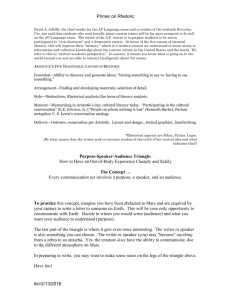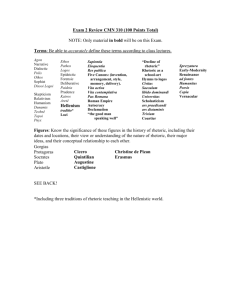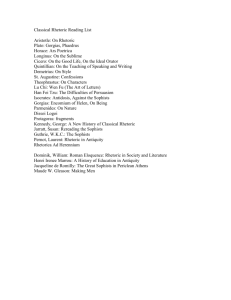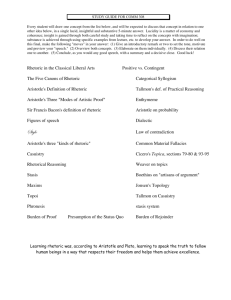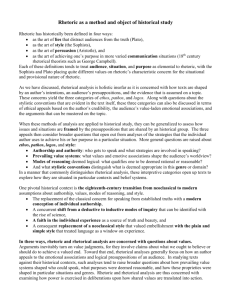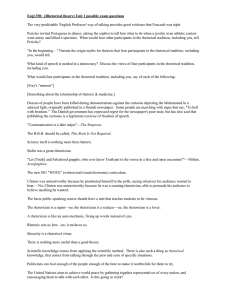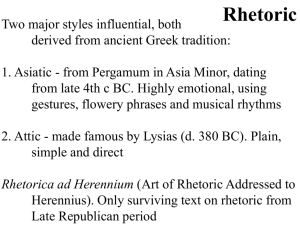Timelines
advertisement
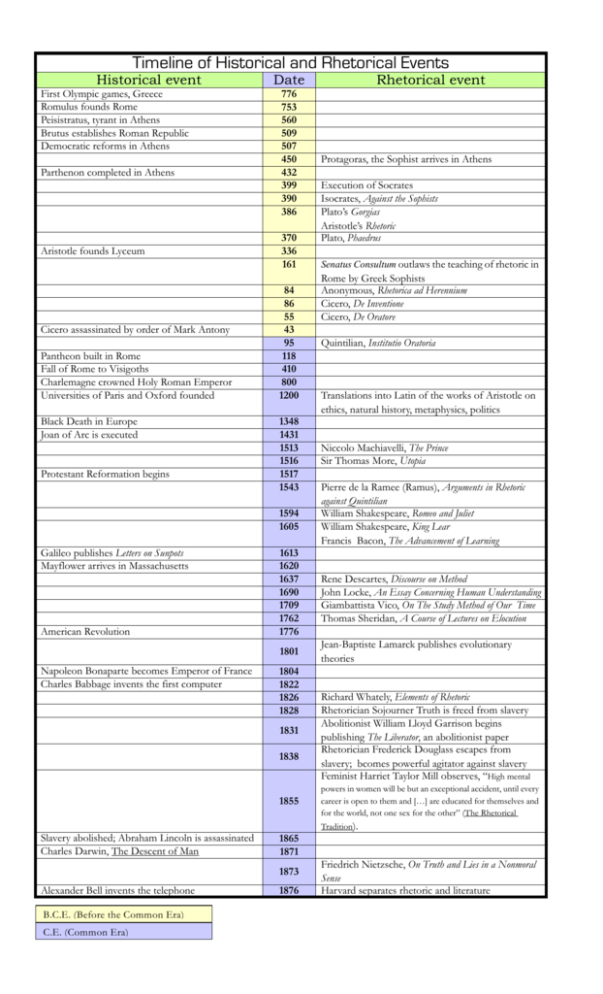
Timeline of Historical and Rhetorical Events Historical event First Olympic games, Greece Romulus founds Rome Peisistratus, tyrant in Athens Brutus establishes Roman Republic Democratic reforms in Athens Parthenon completed in Athens Aristotle founds Lyceum Cicero assassinated by order of Mark Antony Pantheon built in Rome Fall of Rome to Visigoths Charlemagne crowned Holy Roman Emperor Universities of Paris and Oxford founded Black Death in Europe Joan of Arc is executed Protestant Reformation begins Date 776 753 560 509 507 450 432 399 390 386 370 336 161 84 86 55 43 95 118 410 800 1200 1348 1431 1513 1516 1517 1543 1594 1605 Galileo publishes Letters on Sunpots Mayflower arrives in Massachusetts American Revolution 1613 1620 1637 1690 1709 1762 1776 1801 Napoleon Bonaparte becomes Emperor of France Charles Babbage invents the first computer 1804 1822 1826 1828 1831 1838 1855 Rhetorical event Protagoras, the Sophist arrives in Athens Execution of Socrates Isocrates, Against the Sophists Plato’s Gorgias Aristotle’s Rhetoric Plato, Phaedrus Senatus Consultum outlaws the teaching of rhetoric in Rome by Greek Sophists Anonymous, Rhetorica ad Herennium Cicero, De Inventione Cicero, De Oratore Quintilian, Institutio Oratoria Translations into Latin of the works of Aristotle on ethics, natural history, metaphysics, politics Niccolo Machiavelli, The Prince Sir Thomas More, Utopia Pierre de la Ramee (Ramus), Arguments in Rhetoric against Quintilian William Shakespeare, Romeo and Juliet William Shakespeare, King Lear Francis Bacon, The Advancement of Learning Rene Descartes, Discourse on Method John Locke, An Essay Concerning Human Understanding Giambattista Vico, On The Study Method of Our Time Thomas Sheridan, A Course of Lectures on Elocution Jean-Baptiste Lamarck publishes evolutionary theories Richard Whately, Elements of Rhetoric Rhetorician Sojourner Truth is freed from slavery Abolitionist William Lloyd Garrison begins publishing The Liberator, an abolitionist paper Rhetorician Frederick Douglass escapes from slavery; bcomes powerful agitator against slavery Feminist Harriet Taylor Mill observes, “High mental powers in women will be but an exceptional accident, until every career is open to them and […] are educated for themselves and for the world, not one sex for the other” (The Rhetorical Tradition). Slavery abolished; Abraham Lincoln is assassinated Charles Darwin, The Descent of Man 1865 1871 1873 Alexander Bell invents the telephone B.C.E. (Before the Common Era) C.E. (Common Era) 1876 Friedrich Nietzsche, On Truth and Lies in a Nonmoral Sense Harvard separates rhetoric and literature
